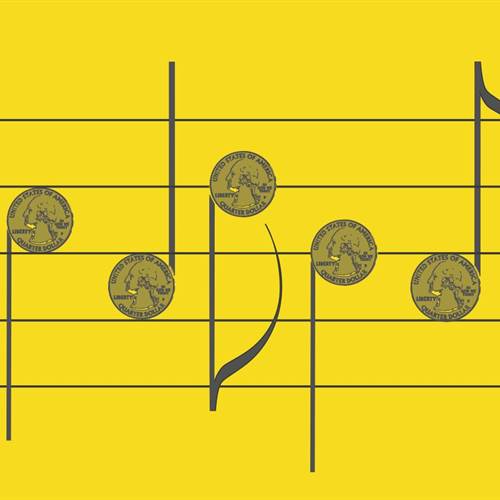
How To Practice Singing Part V: Make Practice Habits Attractive!
Posted Saturday, June 29th 2024 by Zac Bradford
In Part V of the How To Practice Singing series, Zac Bradford uses inspiration from James Clear to explore the idea of making practice habits attractive and irresistible to singers through the principle of temptation bundling.
You can view part I of the series here, where we compared two different practicing styles: Striving vs Contentment. You can view part II of the series here, where we discuss how you can practice with intention. You can view part III of the series here, where we explore the nature of identity-based habits. You can view part IV of the series here, where we devise practical ways of creating practice habits for singing that promotes consistency.
Forming habits can be fun (and irresistible)!
In the context of decision-making and habit-building, the visibility and attraction of options often drive our choices, especially when unexpected free time arises. Imagine someone with an hour to spare on a Saturday afternoon after a tiring week, facing the choice between singing practice or indulging in a Netflix binge. Let's assume this singer has made the practice obvious by having the microphone and music stand set up and ready. Despite both options being equally visible, the individual is likely to lean towards the more attractive choice: the Netflix binge. This highlights the tendency to prefer immediate pleasure or fulfillment (Netflix), over the option with delayed gratification (singing practice).
In James Clear’s podcast interview with Dr. Peter Attia, Clear mentions that habits with immediate rewards often have delayed consequences, and habits with delayed rewards often have immediate consequences (Attia, 2021). With regard to singing practice, the immediate “consequence” may be that you have to apply mental effort to learn a new motor skill, and the delayed reward may come weeks or months later when the new coordination becomes habitual. With regard to something like smoking a cigarette, the opposite is true. The immediate reward is that the craving has been met as soon as the individual starts smoking, and the delayed consequence of health issues may not be apparent until years down the track.
If our singing practice habit is to be established and maintained in the long term we benefit from learning to make it irresistible. In the previous article of this series, we explored ideas for making a singing practice habit more obvious. In this article, we are going to explore three key strategies for making practice irresistible! The strategies are Temptation Bundling, Belonging to a Community that models the habits you want, and Creating a Motivation Ritual.
Temptation Bundling
To quote James Clear, “Temptation bundling works by linking an action you want to do with an action you need to do”. (Clear, p.109)
If you know singing practice is essential for improving your craft, even though it might not be the most enjoyable or glamorous aspect of singing, combining it with a task you genuinely enjoy—such as gaming, or reading a book—can be a fruitful strategy. This is where the concept of 'temptation bundling' comes into play, integrating singing practice into activities you look forward to.
Temptation Bundling Formula:
After [HABIT I NEED], I will [HABIT I WANT].
For example: After practicing vocal exercises, I will enjoy a cup of coffee and listen to a podcast.
Combining Temptation Bundling and Habit Stacking can also be a fruitful strategy for guiding your behavior. In Chapter 8 of his best-selling book James Clear lays out the Habit Stacking + Temptation Bundling Formula (Clear, p.110):
- After [CURRENT HABIT], I will [HABIT I NEED].
- After [HABIT I NEED], I will [HABIT I WANT].
This combined formula used for singing practice could be:
- After getting dressed for work, I will practice vocal exercises.
- After practicing vocal exercises, I will enjoy a cup of coffee and listen to a podcast.
This approach offers dual benefits. Firstly, it eliminates much of the uncertainty about "when" to practice, which can often lead to feeling overwhelmed. Once you've scheduled it, you gain clarity about the timing (a form of Habit Stacking). Secondly, when you begin your practice, you're more likely to stay motivated because you've linked it to a predetermined reward (Temptation Bundling). Both aspects can make the practice simple and more appealing!
Belonging to a community
For singers, cultivating a supportive community is paramount to the journey. Discovering a community where the habit you aim to develop or uphold (such as regular singing practice) is commonplace can greatly facilitate the process. When it comes to others shaping your habits, there are three main groups that play a pivotal role:
- The Close
- The Many
- The Powerful
The Close
You've probably heard the saying "You are the average of the five people you hang out with most." We've all experienced or observed this phenomenon in one way or another. It's easier to establish or maintain a new habit when you witness others practicing it daily, especially those who are close to you. Developing friendships with like-minded individuals—those who identify themselves as singers—and who share similar habits such as regular practice and training, as well as common goals such as performance, recording, and creating, can greatly enhance your journey. By sharing both the challenges and joys of this journey, growth and development are fostered, making the journey more appealing than going it alone. Finding a supportive community can significantly bolster motivation and accountability.
The Many
“When changing your habits means challenging the tribe, change is attractive. When changing your habits means fitting in with the tribe, change is very attractive”. (Clear, p.121)
When we're part of a group, whether it's a school, sports team, or work project, many of us tend to conform to the group's norms in order to find our place and "fit in" better. We observe what everyone else is doing and often mimic their behavior, even if we may not necessarily believe it's the optimal course of action.
“The normal behavior of the tribe often overpowers the desired behavior of the individual”. Most days, we’d rather be wrong with the crowd than be right by ourselves. (Clear, p.123)
This can have both positive and negative implications, depending on the community you associate with, or the one that accepts you. The specific community may look different for each singer, and can vary greatly based on factors like age, musical genre, and stage of artistic development. For instance, it could be a choir, a church worship team, open mic or jam sessions, regular karaoke gatherings, a musical theater company, a garage band, a college ensemble, or a studio group singing class. Regardless of the specific community, it's equally crucial to connect with individuals who share not only your musical journey but also your identity, desired habits, and goals. Therefore, don't embark on this journey alone, and when selecting your community, choose wisely!
The Powerful
“High-status people enjoy the approval, respect, and praise of others. And that means if a behavior can get us approval, respect, and praise, we find it attractive.” (p.122)
While the above statement is often true, I personally would not encourage singers to imitate “The Powerful” in hopes of gaining approval, respect and praise. Rather my stance is to encourage singers to imitate the habits of experts in the field (Opera, Musical Theatre, Rock etc) and by honing your craft in this way, a likely by-product of this craftsmanship would be respect and praise from those in your industry. In other words the motivation for imitation of “The powerful” is honing a craft, not to seek approval, respect or praise. Yet the result may very well be respect and praise from those around you.
"The Powerful'' could be anyone from the seasoned singer in your choir to the talented musician in your band, or even a professional singer you admire. If you can, chat with them about their habits and how they've stuck with them over the years. And if that's not possible, see if they've shared their routines in interviews, blogs, or on social media. Speaking of which, platforms like Instagram often give you a peek into artists' daily routines, like warm-ups and practice sessions. Plus, there are tons of interviews out there where singers spill the beans on their techniques and processes. Check out NYVC's interviews with folks like David Phelps, Take 6, The Bacon Brothers, and Lalah Hathaway for some insights.
Create a Motivation Ritual
A motivation ritual is essentially something you do before engaging in your desired habit that helps uplift your mood. When it comes to singing practice, this ritual could be as simple as savoring a morning cup of tea or taking a few moments to stretch before diving into your practice session.
Having a motivation ritual is crucial because it helps set the stage for your practice session, and once it becomes a habit, it serves as a trigger to kickstart your practice. Personally, since I typically practice in the morning before my teaching sessions each day, my motivation ritual involves opening the blinds to let the morning sunlight flood into the studio. This brief moment of soaking in the morning sun not only feels refreshing but also serves as a relaxing way to prepare myself for my daily practice routine.
To conclude...
Establishing a practice habit that sticks requires making it attractive. By understanding the principles of behavior change and incorporating strategies such as temptation bundling, belonging to a supportive community, and creating motivation rituals, singers can enhance the appeal and sustainability of their practice routines.
Temptation bundling, exemplified by linking enjoyable activities with necessary ones, offers a practical approach to making practice sessions more enticing. Belonging to a supportive community not only provides motivation and accountability but also fosters growth and development through shared experiences. Moreover, imitating the habits of experts in the field (rather than seeking approval or praise) can lead to respect and recognition as a natural by-product of skill refinement.
Lastly, incorporating a motivation ritual before practice sessions can help set the stage for productive and enjoyable practice experiences. By implementing these strategies, singers can cultivate habits that not only endure but also contribute to their growth and success in the long term.
References
Attia, P. (Host). (2021, November 8th). The Drive [Audio podcast]. Episode #183 - James Clear: Building & Changing Habits. Retrieved from [https://youtu.be/Tn1w7Kw8x5E?si=yCXsWGAMnO5PKMsN]
Clear, J. (2018). Atomic habits: An easy & proven way to build good habits & break bad ones. Random House.

Zac Bradford
Director of NYVC Australia/Voice Teacher Associate
Zac Bradford is the Director of NYVC Australia. His clients have reached the Top 10 on the Billboard charts, have been featured in Hollywood films, TV shows, have worked as backing singers for AAA touring artists, and are performing on Broadway, Off-Broadway, 1st US Tours, internationally, and more. His clients also perform in famous live music venues including Carnegie Hall, Lincoln Center, The Blue Note, Rockwood Music Hall and The Bitter End.

Why Am I Doing This Again?
I had a one hour break in which to eat, go to the bank, respond to client emails, and be ready to start the second half of a lengthy teaching day. I raced out of the studio past the slow walkers to the bank...

Happy St. Patrick's Day!
May the road rise to meet you...

The Money's in the Middle: Why your lower and middle range deserves more love
Everyone is always worried about the “money notes”: the high notes in a song. What about all the other notes?! Low and middle notes deserve much more love and respect than they usually get.